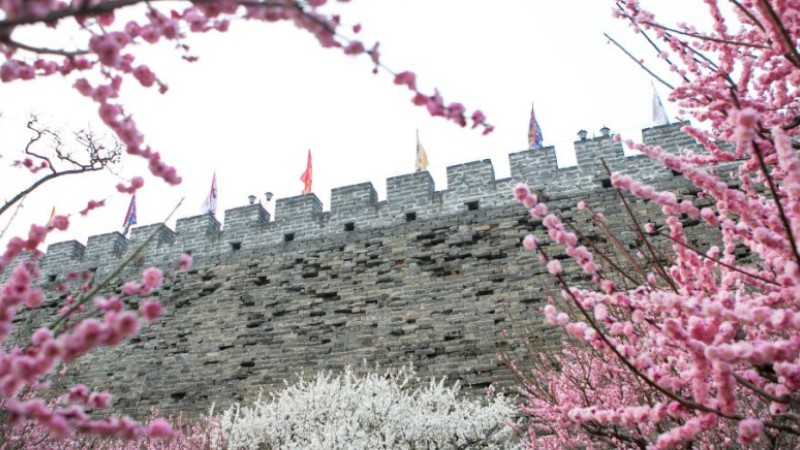Feature: Xi's inspiring speech in memories of Russians from two generations
MOSCOW, March 22 (Xinhua) -- Anatoly Torkunov, president of the Moscow State Institute of International Relations (MGIMO), was still excited to recall the memorable speech Chinese President Xi Jinping gave at the Russian university a decade ago.
"I can still remember how the auditorium was packed with teachers and students," Torkunov said, referring to the speech President Xi delivered on March 23, 2013, during his first state visit to Russia since he was elected president of China.
Torkunov said that Xi's speech was meaningful, deep and thought-provoking and would be significant for any university, especially those focusing on international relations, world politics and economics. "This was also an opportunity not to just directly listen, but to feel politics."
"President Xi spoke not only as the leader of a large country, but also as a teacher, because the lecture wasn't only politically meaningful, it was also meaningful from an academic perspective," he added.
Alexander Bobrov, 30, who is now the director of the MGIMO School of Government and International Affairs, also listened to the Chinese president's speech 10 years ago, when he was a student at the university.
"It was a big event for us. We were very glad to see the Chinese leader, who spoke a lot about the development of bilateral relations, and demonstrated great knowledge of Russian culture," Bobrov said.
"He is a very powerful person with will, character, great charisma," Torkunov stressed.
As to Xi's proposal of the concept of a community with a shared future for mankind in his speech, Torkunov said, "We are proud that conceptually this idea was first introduced at our university."
Torkunov recalled that Xi said that countries are linked with and dependent on one another at a level never seen before, and mankind, living in the same global village, have increasingly emerged as a community with a shared future in which everyone's interests are closely entwined.
Many things in China's political life today are connected in a way with centuries-old and millennia-old Chinese history and are drawn from the teachings of great Chinese philosophers, the MGIMO president said.
Torkunov believes that China fundamentally adheres to this concept and uses it in practice -- in the country's development.
In comparison to other theories on international relations, Torkunov said the concept not only profoundly affects many important aspects of national life, but also encompasses the true meaning of development for all.
"Regardless of the size of the economy of any particular country, relations should be built with an emphasis on equality, and it is necessary to seek a peaceful solution to any issue," Torkunov said.
"Ten years have passed but its relevance hasn't declined. It's only becoming more prevalent," Torkunov said, adding that this concept remains important when major changes are taking place now.
"This concept advocates that all countries with a unique culture or even civilizations didn't develop according to some kind of standard, some unified paradigm, so that we have both unity and diversity," Bobrov said.
Bobrov believes that in today's multipolar world, countries need to establish such international relations that each state can make its positive contribution to the development of all mankind.
"The concept will contribute to the progressive development of mankind for many years, or even decades to come," said Bobrov.
Torkunov and Bobrov share the view that Xi's visit to MGIMO and his speech 10 years ago have played an important role in the development of Russia-China relations.
"It gave us a deeper understanding of China's views on various issues and China's role in modern international life. It also motivated us greatly to study China and Russia-China relations," Torkunov said.
On the same day that Torkunov and Bobrov shared with Xinhua their views on Xi's speech, an event dedicated to Chinese culture and language took place in MGIMO.
More than 100 teachers and students from many schools in Moscow were invited to participate in a Chinese tea tasting ceremony, calligraphy and paper cutting workshops. MGIMO students also took part in discussions held in Chinese.
"We have a large group of students who are studying Chinese. Moreover, today, professors and teachers are actively studying China," Torkunov said.
MGIMO has signed long-term cooperation agreements with more than 10 Chinese universities and research institutes, including Peking University, China Foreign Affairs University, Beijing Foreign Studies University, and the Institute of Russian, East European and Central Asian Studies of the Chinese Academy of Social Sciences. Since the 1950s, more than 250 Chinese students have graduated from MGIMO, and currently there are 84 Chinese students studying here.
"We are very much looking forward to developing all kinds of academic ties with Chinese institutions. If it weren't for President Xi's visit in 2013, this process could have taken more years, and we would have had to work harder to achieve the results that we have already achieved," Bobrov said.
He also noted that a wide variety of students want to learn Chinese and study in China.
Torkunov said that Russia-China relations are developing comprehensively and cooperation between Chinese and Russian universities will continue to enhance. "We will be happy if there are more Chinese students, we will also send more our students to China to study."
Photos
Related Stories
- China-Russia economic, trade cooperation in steady development
- China-Russia ties a global stabilizer
- China-Russia comprehensive strategic partnership of coordination for a new era to keep advancing at high level
- Commentary: Closer China-Russia ties vital to building a multipolar world
- Chinese FM expounds on Xi's state visit to Russia
Copyright © 2023 People's Daily Online. All Rights Reserved.









